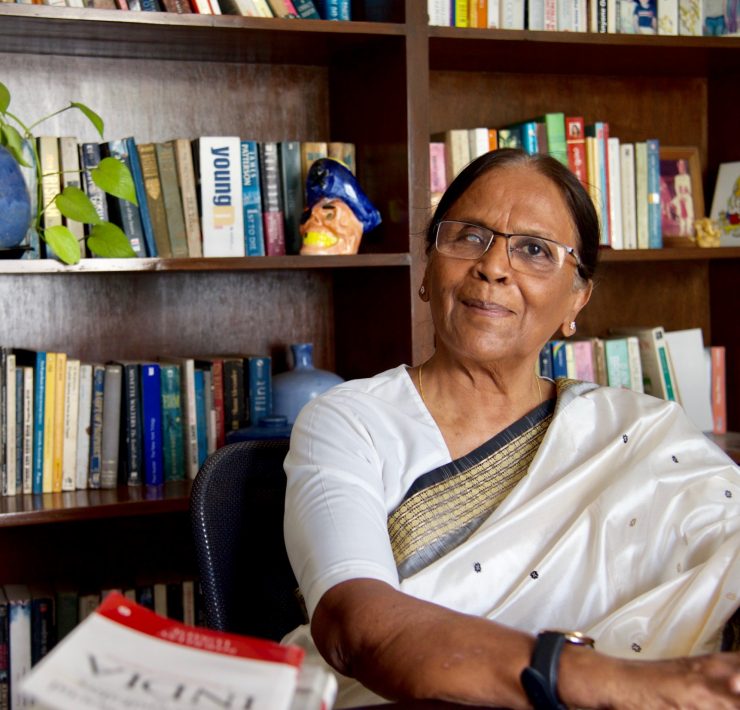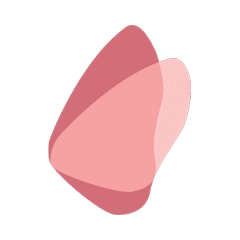Petal power: Turning floral discards into incense sticks
- Meet the entrepreneur duo collecting flowers from across Hyderabad to make eco-friendly products that also empower local women.
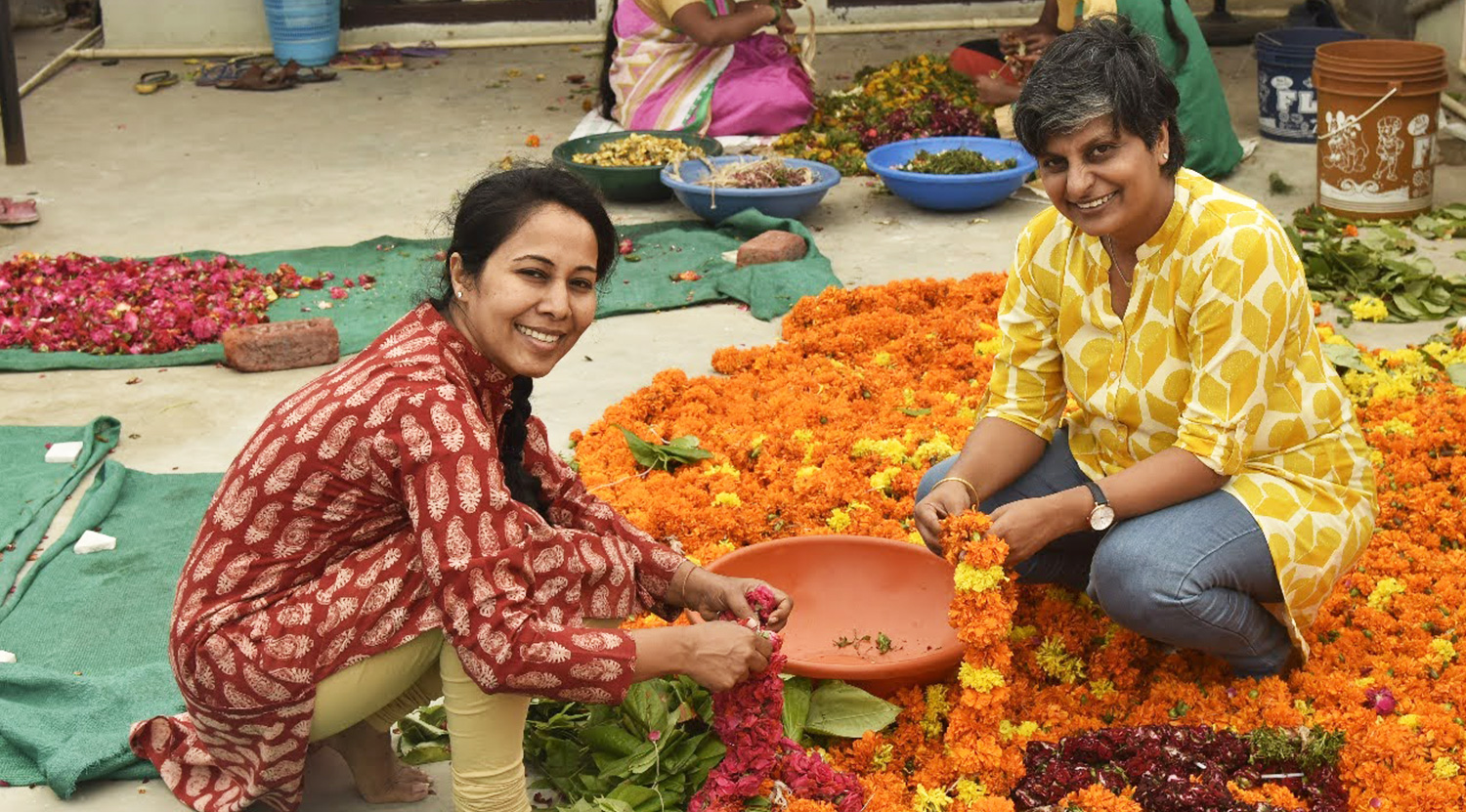
Krutika Behrawala is a journalist who enjoys writing about food,…
It all began with flowers from their puja room, help from friends and family, and a YouTube video.
A few years ago, Hyderabad-based friends Maya Vivek and Minal Dalmia came across a YouTube video about a venture in north India that recycles flowers. Curious, they looked online for more information about flowers, their uses and ways to recycle them. Then, they tried an experiment in the kitchen – making incense sticks from floral discards. Maya, who worked as an international freight forwarder, recollects, “Our family members, children and neighbours too, helped us to sort flowers, dry them and roll incense sticks. Our first incense stick looked awesome, but smelled awful!”
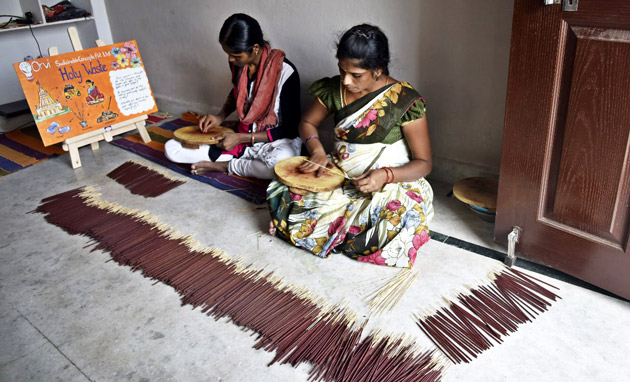
Minal, who was working in her family-owned business of making plastic injection moulds back then, says, “We knew we had probably scratched only the surface.”
Maya and Minal’s endeavour also stands up for women empowerment by employing locals from Gundlapochampalli, a village near Hyderabad.
But the idea stayed with them. Soon, the duo, who became friends because their children were classmates, quit their respective professions. Keen to turn into entrepreneurs, they enrolled in online and offline courses to learn the art of making incense, soaps and other products. Armed with this knowledge, they birthed Holy Waste, an initiative that recycles flowers into eco-friendly incense sticks, paraben-free soaps and compost.
Launched under the umbrella of Oorvi Sustainable Concepts, a social enterprise incorporated in April 2019, the endeavour also stands up for women empowerment by employing locals from Gundlapochampalli, a village near Hyderabad. “Having lived on the periphery of Hyderabad for a few years, both of us had discussed a few times about starting something which would benefit the women and the environment around the village,” reasons Maya.
Temple run
On a daily basis, Hyderabad reportedly generates roughly 7,000 million tonne of garbage. Floral discards are part of this waste too, considering that the city’s markets bring in 1,000 million tonnes of flowers daily. This waste typically peaks during wedding and festive seasons.
For the pilot project, they got in touch with Sri Subrahmanyaswamy Temple in Skandagiri and collected 20kgs of floral waste per week.
“There’s no waste management practised by floral waste generators currently. They either hand it over to the civic bodies or leave it on the streets. With no process for floral waste, the dump becomes part of a landfill or rots in water bodies, causing harm to the environment,” says Minal.
So, the duo began to focus on temples and other places of worship for collecting floral waste. For the pilot project, they got in touch with Sri Subrahmanyaswamy Temple in Skandagiri and collected 20kgs of floral waste per week. “At that point, the quantity seemed too huge to be consumed,” recalls Maya. Since then, however, they have partnered with 45 temples across Hyderabad. They also collect floral waste from vendors, event planners and decorators.
Rejuvenating roses
At every place of worship, the team places large collecting drums and trains the ground staff regarding the initial segregation where floral waste is separated from the rest. This segregated waste is then brought to their rented facility in Gundlapochampalli.
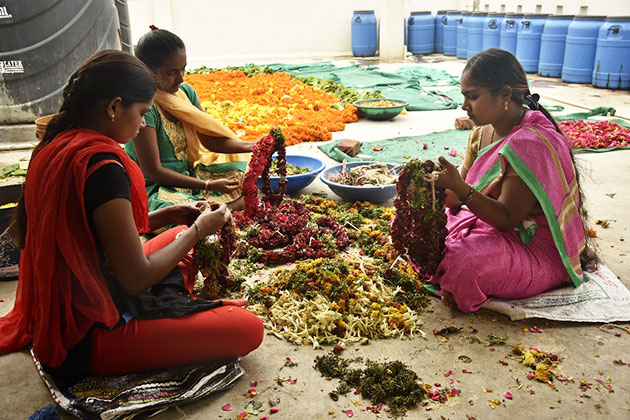
Then, 10 local women, called ‘floral rejuvenators’, get to work. They separate the flowers according to varieties rather than colour — piling together roses, types of marigolds, chrysanthemums, frangipani, and more. “We use almost all flowers that we get as part of our collection,” informs Maya.
The petals are plucked, sun-dried for three days, crushed into powder, kneaded into a paste using a natural binder, and hand-rolled into incense sticks — all without the use of charcoal. “Though the quantity of charcoal is less per stick, it’s still a fossil fuel and a burden on the environment,” says Minal. She adds that 200g of dried flowers go into making each stick, which burns for 45 minutes and emanates fewer fumes.
“We wanted fragrances that are safe to inhale and not contain any synthetic additives for the sake of effusion or reduction of costs, thereby compromising on the wellbeing of our lungs,” says Maya.
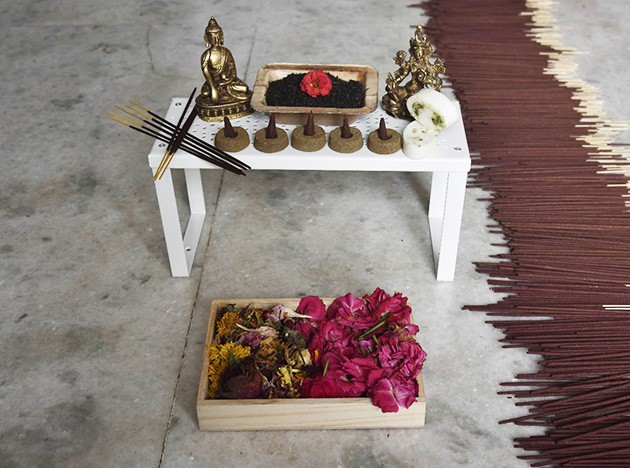
The floral waste is also transformed into dhoop sticks and handmade paraben-free soaps, which are infused with extracts of cold-pressed vegetable and other essential oils. The leftover waste is then used to make compost. In the offing are wax tablets too. The product packaging uses upcycled saris and dupattas. “That was an additional way of generating employment,” adds Minal.
The floral waste is also transformed into dhoop sticks and handmade paraben-free soaps, which are infused with extracts of cold-pressed vegetable and other essential oils.
The duo also signed up for an incubation programme with A-Idea NAARM, a food and agriculture business incubator in Hyderabad. “It helped us meet many academicians who gave us valuable insights on what can be done to get our incense into the market and without compromising on our ethos,” says Maya. Since then, they’ve participated in monthly organic markets and retail at several eco-conscious stores in Hyderabad and Bengaluru. The products will soon be available on Amazon and Flipkart.
This initiative helps keep away 200kgs of floral waste from landfills on a daily basis and it won the Best Green Startup award under Eco Ideas by Green India Awards 2019. “Having a zero-waste unit has been our dream, and we’re working towards that actively,” concludes Minal.
Image Courtesy: Holy Waste
Krutika Behrawala is a journalist who enjoys writing about food, culture and communities. After chasing deadlines in the newsrooms of major publications for a decade, she has settled into freelancing to write mindfully, tell stories that make a difference and work towards a sustainable way of living, one step at a time.




